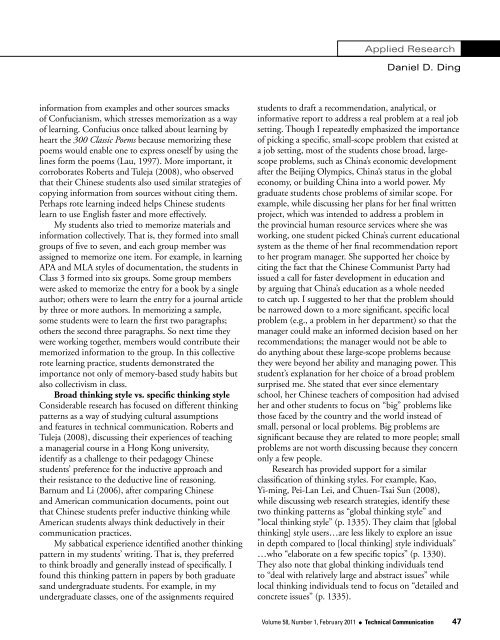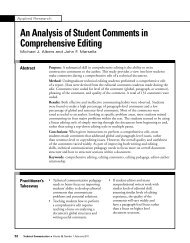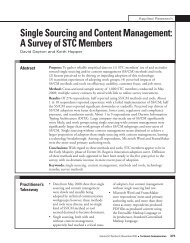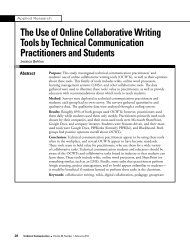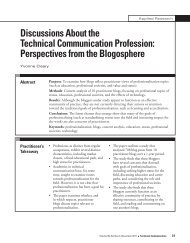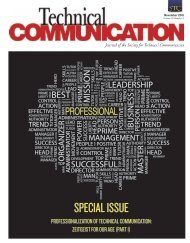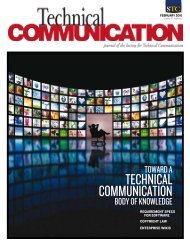When Traditional Chinese Culture Meets a Technical ...
When Traditional Chinese Culture Meets a Technical ...
When Traditional Chinese Culture Meets a Technical ...
Create successful ePaper yourself
Turn your PDF publications into a flip-book with our unique Google optimized e-Paper software.
Applied ResearchDaniel D. Dinginformation from examples and other sources smacksof Confucianism, which stresses memorization as a wayof learning. Confucius once talked about learning byheart the 300 Classic Poems because memorizing thesepoems would enable one to express oneself by using thelines form the poems (Lau, 1997). More important, itcorroborates Roberts and Tuleja (2008), who observedthat their <strong>Chinese</strong> students also used similar strategies ofcopying information from sources without citing them.Perhaps rote learning indeed helps <strong>Chinese</strong> studentslearn to use English faster and more effectively.My students also tried to memorize materials andinformation collectively. That is, they formed into smallgroups of five to seven, and each group member wasassigned to memorize one item. For example, in learningAPA and MLA styles of documentation, the students inClass 3 formed into six groups. Some group memberswere asked to memorize the entry for a book by a singleauthor; others were to learn the entry for a journal articleby three or more authors. In memorizing a sample,some students were to learn the first two paragraphs;others the second three paragraphs. So next time theywere working together, members would contribute theirmemorized information to the group. In this collectiverote learning practice, students demonstrated theimportance not only of memory-based study habits butalso collectivism in class.Broad thinking style vs. specific thinking styleConsiderable research has focused on different thinkingpatterns as a way of studying cultural assumptionsand features in technical communication. Roberts andTuleja (2008), discussing their experiences of teachinga managerial course in a Hong Kong university,identify as a challenge to their pedagogy <strong>Chinese</strong>students’ preference for the inductive approach andtheir resistance to the deductive line of reasoning.Barnum and Li (2006), after comparing <strong>Chinese</strong>and American communication documents, point outthat <strong>Chinese</strong> students prefer inductive thinking whileAmerican students always think deductively in theircommunication practices.My sabbatical experience identified another thinkingpattern in my students’ writing. That is, they preferredto think broadly and generally instead of specifically. Ifound this thinking pattern in papers by both graduatesand undergraduate students. For example, in myundergraduate classes, one of the assignments requiredstudents to draft a recommendation, analytical, orinformative report to address a real problem at a real jobsetting. Though I repeatedly emphasized the importanceof picking a specific, small-scope problem that existed ata job setting, most of the students chose broad, largescopeproblems, such as China’s economic developmentafter the Beijing Olympics, China’s status in the globaleconomy, or building China into a world power. Mygraduate students chose problems of similar scope. Forexample, while discussing her plans for her final writtenproject, which was intended to address a problem inthe provincial human resource services where she wasworking, one student picked China’s current educationalsystem as the theme of her final recommendation reportto her program manager. She supported her choice byciting the fact that the <strong>Chinese</strong> Communist Party hadissued a call for faster development in education andby arguing that China’s education as a whole neededto catch up. I suggested to her that the problem shouldbe narrowed down to a more significant, specific localproblem (e.g., a problem in her department) so that themanager could make an informed decision based on herrecommendations; the manager would not be able todo anything about these large-scope problems becausethey were beyond her ability and managing power. Thisstudent’s explanation for her choice of a broad problemsurprised me. She stated that ever since elementaryschool, her <strong>Chinese</strong> teachers of composition had advisedher and other students to focus on “big” problems likethose faced by the country and the world instead ofsmall, personal or local problems. Big problems aresignificant because they are related to more people; smallproblems are not worth discussing because they concernonly a few people.Research has provided support for a similarclassification of thinking styles. For example, Kao,Yi-ming, Pei-Lan Lei, and Chuen-Tsai Sun (2008),while discussing web research strategies, identify thesetwo thinking patterns as “global thinking style” and“local thinking style” (p. 1335). They claim that [globalthinking] style users…are less likely to explore an issuein depth compared to [local thinking] style individuals”…who “elaborate on a few specific topics” (p. 1330).They also note that global thinking individuals tendto “deal with relatively large and abstract issues” whilelocal thinking individuals tend to focus on “detailed andconcrete issues” (p. 1335).Volume 58, Number 1, February 2011 l <strong>Technical</strong> Communication 47


